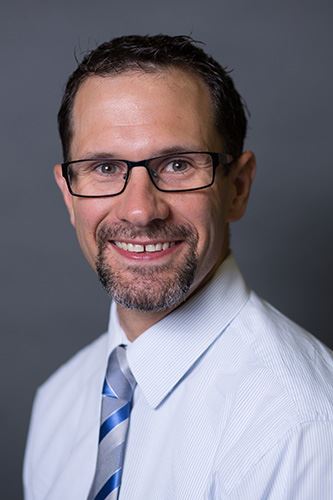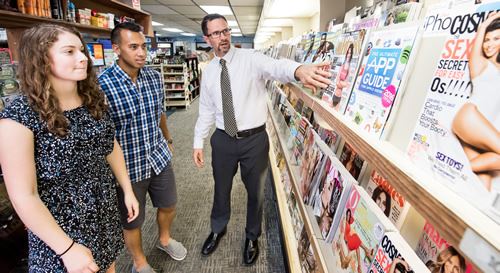
School name: The College of Wooster, Wooster, OH
Type of college/university: Small Liberal Arts College
School locale: Micropolitan – The city of Wooster, OH is a small but thriving city in the middle of a rural area of Ohio
Classes you teach: Statistics, Clinical Psychology, Abnormal Psychology, Health Psychology, Personality Research
Average class size: 20-30 students
What’s the best advice about teaching you’ve ever received?
I asked a senior colleague, David Elkin, PhD from a professional organization, Division 54 of the APA, how he manages to publish, teach, and engage in clinical work. His advice changed my perspective on everything I do professionally. He said: Whatever you do, double dip. If you see clients, then do research with them. If you teach, collect data on your teaching. This advice really resonated with me. I believe that this approach will close the gap between research and practice (either clinical practice or teaching practice). I’ve since published several papers based on my teaching practices, and this advice has really helped me engage my research activities from a pedagogical perspective to promote student learning.
What book or article has shaped your work as a psychology teacher?
Randy Pausch’s “The Last Lecture” is something I return to every year – both the book and the video. If you have never heard of it, block 1 hour, google it, and watch the video. It’s less about teaching psychology, and more about being a good human who happens to teach.
 Briefly tell us about your favorite lecture topic or course to teach.
Briefly tell us about your favorite lecture topic or course to teach.
I love teaching statistics. To borrow a term from Pausch’s “The Last Lecture”, I see this course as a huge head-fake. In many sports, athletes will perform a head-fake; they make a defender think they are going one way, but they are actually going a different direction. Students often think statistics is about one thing, but it’s really about something else. Most students enter statistics classes thinking that the class will be about math, but it’s really a class on scientific or empirical thinking. It is epistemological at its core – how do we know what we know in psychology? Yes, math is involved, but only as a means to an end. I try to focus on the end – the way of thinking. I try to keep it very practical and applied – using math in this way, in this context, helps us understand if a treatment for depression really works (as one example).
Briefly describe a favorite assignment or in-class activity.
I’ve had really positive reactions to a N of 1 research design project in my health psychology class. I use N of 1 research designs in quite a bit of my published research, and I’ve learned so much about their value, yet they are often ignored or overlooked by many research methods books and by many leading researchers. So, most undergraduates, in my opinion, are under-exposed to this family of methodologies. Therefore, I developed a semester-long project in my Health Psychology class to address this issue. The semester is divided in to typical N of 1 study phases (baseline, intervention). They track a specific health behavior of their choosing. Common examples are sleep amount/quality or healthy eating. We work collaboratively on operationalizing the behavior and developing systematic approaches to measuring it. As students learn principles of health behavior change, they develop an intervention for themselves, and then apply it. They track their behavior to see if it works, and we analyze the data using a mixture of statistical and graphing methods. I literally had a student quick smoking one semester! Another student developed a new life habit of teeth flossing.
What teaching or learning techniques work best for you?
I learned about an approach to teaching called “Interteaching” at a workshop from the National Institute on the Teaching of Psychology (NITOP), led by Bryan Saville, PhD. Given that my clinical background is very behaviorally-based, I had tried various applications of behaviorism to a classroom, but failed repeatedly. Interteaching is a very well thought out approach that focuses on learning behaviors (class preparations, study skills, dyadic discussions, asking good questions). Effective use of interteaching increases the likelihood of students engaging in these behaviors through positive reinforcement. High-stakes testing is minimized and replaced by frequent low-stakes assessments with rapid feedback and daily engagement or monitoring of students’ pre-class preparations and in-class discussions. I now do classic lectures very little (almost never), because they are very inefficient for helping students learn how to learn.
What’s your workspace like?
My workspace is changing! I just changed offices on July 1 to assume duties as a full-time administrator (Dean for Curriculum and Academic Engagement). This followed a short stint of 1.5 years as an Associate Dean, which was a half-time appointment. So, I was spending half of my time in the Psychology Department, and then the other half in another building. So, I’ve been in 3 different offices over the past 3 years! I try to create a welcoming environment by situating the office so that students or colleagues feel comfortable. A constant throughout these transitions, however, is my research lab. It has a huge white board (two-tiered), various instruments and computer software, and a locked closet. I refer to it as “the vault”, because it’s behind a hallway that is somewhat hidden, then there’s another locked door, and there are no windows. It’s a great place to focus. I suppose a third workspace in this modern world is wherever I can write. I enjoy finding quiet spaces with nice views anywhere I travel. If I have my laptop, I can write!
Three words that best describe your teaching style
Engaging, enthusiastic, supportive
What is your teaching philosophy in 8 words or fewer?
Provide opportunities and get out of the way (I learned this from Michael Roberts, PhD, another senior colleague from Division 54 of APA).
Tell us about a teaching disaster (or embarrassment) you’ve had and how you dealt with the situation.
Chai Latte spilled all over a tile floor at the beginning of class! I was a graduate student, literally living in my pastor’s basement to save money. I was teaching an Introduction to Psychology Course early in the morning. I treated myself to a Venti Chai Latte that morning – I felt so academic! Unfortunately, the entire beverage slipped out of my hands and this view of myself as an aspiring academic spilled across the entire floor. It was embarrassing, disruptive, and a great reminder that it doesn’t take name brand coffee-like beverages to be a good teacher!
What is something your students would be surprised to learn about you?
A lot of people think that I’m extroverted because I am very high energy and I say Hi to everyone. However, extraversion is multi-dimensional. I tend to score high on warmth/friendliness, activity/activity level, and positive emotions/cheerfulness. However, on other facets of this personality scale I score very low (or high if you think of introversion as a strength!). I have low scores on Gregariousness and excitement-seeking. I thrive in focused, alone time, and my hobbies align with that. I enjoy woodworking (think hours alone in a woodshop) and hunting (think hours alone in the outdoors). My family enjoys the outdoors as we do our ‘vacations’ with camping gear. We look for seclusion, peace, and tranquility (which is hard to find with young children in tow!)
What are you currently reading for pleasure?
My summer reading aligns with the College of Wooster’s assigned summer reading for first year students – Writings on the Wall by Kareem Abdul-Jabbar.
What tech tool could you not live without?
I love the outdoors, so I like to think that I could live quite well without access to any modern technology. We say we couldn’t live without this or that, but humans thrived (perhaps more than we do now) for a very long time without what we currently call technology. In my professional world, however, I am so very grateful to a tremendous staff in our Libraries. They enable me to access virtually any scholarly resource from virtually anywhere in the world, in a very short period of time.
What’s your hallway chatter like? What do you talk to colleagues about most (whether or not it is related to teaching/school)?
I like to think that I talk with them about whatever they want to talk about, but that’s a hope more than a reality, perhaps. I’m usually joking around, being silly, and trying to make the people around me smile and enjoy their time at work. Ask me about my research, and I can talk for a while. Ask me about my hobbies, and you better grab a Venti (without spilling it).
